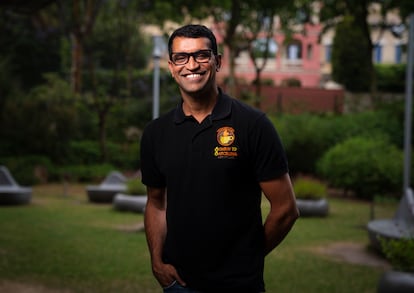Amin Sheikh, Indian entrepreneur: ‘Many kids have everything, but they are still depressed and frustrated’
Born in a Bombay slum, Sheikh spent his childhood sleeping on the street, delivering packages for drug traffickers and eating the food that restaurants threw away. Today, he runs socially-minded cafes that support vulnerable Indian adolescents


Amin Sheikh, 42, was born in one of Mumbai’s many shantytowns. Back in 1980, the megacity had about eight million inhabitants. Today, more than twice as many people live there – it’s one of India’s richest and most unequal cities. Around 40% of Mumbai (Bombay) residents live in slums like the one where Sheikh grew up.
At the age of five, he and his sister fled the family home, where they were being mistreated. He lived a difficult life on the streets, working in whatever jobs he could find, not being able to study. At the age of eight, a nun took him to a shelter for homeless children. And, in his twenties, he met an Indian artist, who hired him as a driver. This completely changed his life.
Once, Sheikh traveled with the artist to Barcelona. While there, upon discovering another reality, he decided that he wanted to promote a social initiative that would break the vicious cycle of poverty that traps thousands of orphaned teenagers who live on the streets of his hometown. They often turn to crime and violence to survive.
But before he set out on this philanthropic mission, he had a dream to fulfill: saving enough money to buy a car and set up a tour company. It was in 2016 when he founded the Bombay to Barcelona Library Café in his city. Today, the coffee shop has three locations… but they are more than just coffee shops. With this project, he has managed to provide shelter, jobs and training for more than 60 street children, who he supports with the revenue from his establishments.
This past May, Sheikh returned to Spain, where he has given several conferences to discuss his project and share his background. He tells his story in his self-published book, Life is Life, recently reissued. On May 25, he participated in the Community Building conference at the prestigious ESADE Business School.
Question. Why did you run away from home at the age of five?
Answer. My stepfather used to beat me with a belt. My mother didn’t want me to play… [she just wanted me] to work 10 hours a day. She was the second of 13 children and had [had] an arranged marriage. I had to live in a [train] station for three years, until Sister Seraphine welcomed me into her orphanage.
Q. How did you survive during those years on the street?
A. I did many jobs, more than 30. I was the guy for everything. I shined shoes or washed dishes in restaurants. Whatever food was left over, they would give it to me. I would sing on a train and carry suitcases that weighed [30 or 40 pounds] for tips… it wasn’t easy for a child. But the worst thing [was when I had to] work for drug dealers; I saw the worst things you can imagine in the brothel areas.
“During the pandemic, we were all in the same boat: it didn’t matter if you were rich or not. In Europe, it was experienced as a tragedy… but in Asia, it was just one more problem.”
Q. In your book, you mention that several “guardian angels” – such as your sister, or your boss, Eustace Fernandes – gave you enough confidence to build your future. Are you trying to do the same with the teenagers you care for now?
A. They come from an orphanage. They know that they can [make a] change and not return to the streets… but it’s very difficult. Today, many children have everything, but they’re not happy: they’re depressed and frustrated. I see this in Spain and Europe. [Young people] think life is easy, but life isn’t easy if you don’t work for it, you know? I think the key to any human life is to work for something you believe in… but many people believe that it’s their right to have it.
Q. What are the biggest differences that you’ve noticed during your many trips between Bombay and Barcelona?
A. For the first time, during the pandemic, we were all in the same boat: it didn’t matter if you were rich or not. In Europe, it was experienced as a tragedy… but in Asia, it was just one more problem. When you have problems every day, a little good thing turns into happiness. I think that’s the difference between growing up in the West and growing up in Asia. There, you always have to be happy… and as soon as there’s a small problem, you get depressed. You cannot always be happy; you have to accept the moment that touches you and change it.
Q. What’s the biggest challenge for children nowadays?
A. As soon as a child cries in Europe, they buy him something. India is also becoming a very consumerist country. This is not how you give them a better life: it’s important to teach them values and limits, but we’re turning them into plastic beings. Our leaders fail to care for people. The older ones, especially. [It was a shock for me to see] the food bank in Barcelona, where you see all the people [volunteering] who are 75, 80-years old… this is the goal of our lives!
The new generations isn’t gold. It’s completely plastic. They don’t have any [ability to] feel for others. You go into somebody’s home and see young people – 17, 18, 19-years-old – eating. Not even for one single moment will [they] ask you, “do you want to eat? Did you eat?”
Q. You managed to raise $350,000 to set up your first social cafeteria eight years ago. How did you do it?
A. I didn’t request loans from any bank; the interest rates they ask for are criminal. I also didn’t receive sponsorships from any company. It was all thanks to my book and the [coffee sales]. Today, we pay $6,000 in rent and we’re working to be able to buy [our main location].
I’ve knocked on many doors [belonging to] rich men in Spain [for donations]… none have responded. I cannot send the money from the NGO (which is managed by volunteers in Madrid) to India – we only use it to pay for the kids’ trips to Spain to study. In half-a-year, I hope to be able to set up another NGO in Bombay to be able to manage the donations.
Q. How do you find the time to work as a tour guide, take care of your son and manage the coffee shops?
A. I spend quality time with [the kids in the program] and my son. After school, he’s usually with me. He’s not a scared kid. He talks to the [coffee shop] customers, because he sees his father talking to a lot of people. He says, “Good morning, we have the best coffee and hot chocolate!” Children become what their parents are. Now, children are lost. You ask them something and they say “I don’t know.” You have to show them the way… you have to support them unconditionally.
Sign up for our weekly newsletter to get more English-language news coverage from EL PAÍS USA Edition
Tu suscripción se está usando en otro dispositivo
¿Quieres añadir otro usuario a tu suscripción?
Si continúas leyendo en este dispositivo, no se podrá leer en el otro.
FlechaTu suscripción se está usando en otro dispositivo y solo puedes acceder a EL PAÍS desde un dispositivo a la vez.
Si quieres compartir tu cuenta, cambia tu suscripción a la modalidad Premium, así podrás añadir otro usuario. Cada uno accederá con su propia cuenta de email, lo que os permitirá personalizar vuestra experiencia en EL PAÍS.
¿Tienes una suscripción de empresa? Accede aquí para contratar más cuentas.
En el caso de no saber quién está usando tu cuenta, te recomendamos cambiar tu contraseña aquí.
Si decides continuar compartiendo tu cuenta, este mensaje se mostrará en tu dispositivo y en el de la otra persona que está usando tu cuenta de forma indefinida, afectando a tu experiencia de lectura. Puedes consultar aquí los términos y condiciones de la suscripción digital.








































